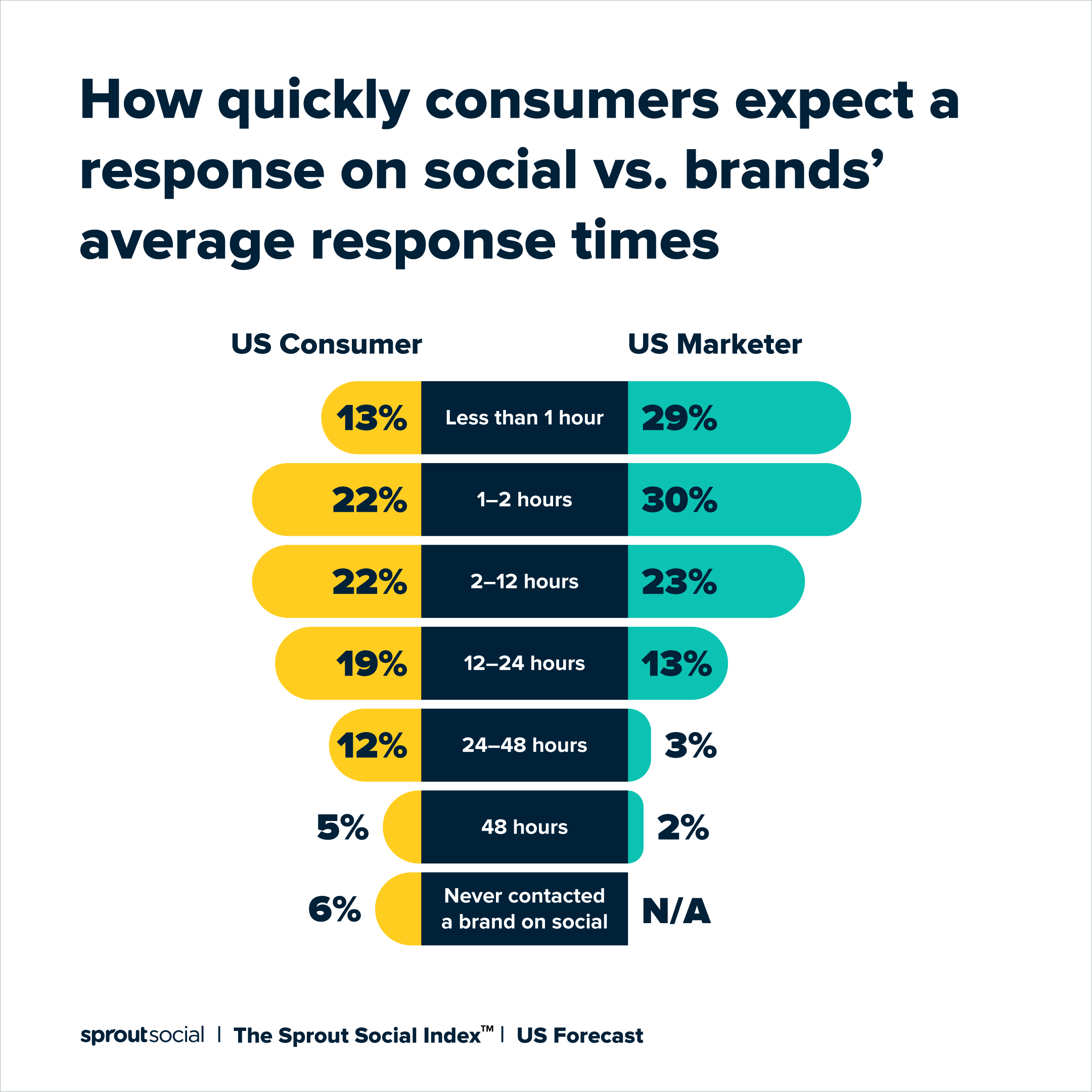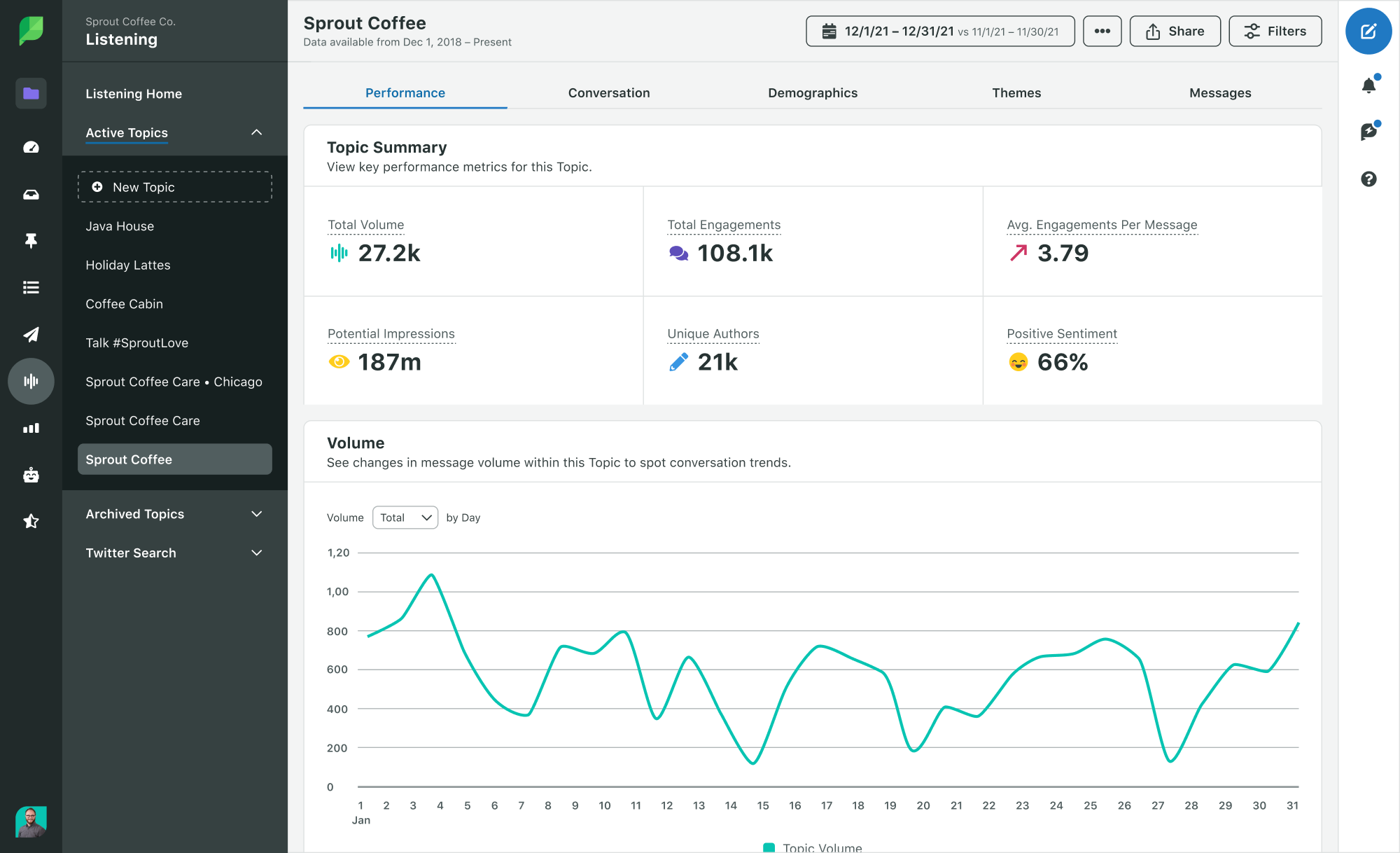The impact of social media across every part of your business
Written by Aubree Smith
Published on February 22, 2023
Reading time 7 minutes

Social media isn’t just a digital billboard for your brand: It’s a portal to direct connection with your ideal customers and a pathway to powerful insights. From customer care to research to recruitment efforts, the impact of social media extends to every aspect of your business.
According to The 2022 Sprout Social Index™, customer-centric brands use social data to inform their:
- Sales strategy
- Product development
- Content strategy
- Customer experience
- Competitive insight
- Market research

By tapping into the ample benefits and business insights social media offers, you can transform the way your entire company operates.
9 ways social media affects your whole business
Here are nine ways social media directly impacts businesses at every stage of the customer journey.
1. Social media transforms customer service
Customer service on social media is a non-negotiable part of an omnichannel support strategy. Consumers tag and direct message brands to resolve their issues across platforms, and hope for swift, helpful and personalized responses in return. According to Index data, more than three-quarters of consumers expect a response on social within 24 hours.

Response rates have serious impacts on customer satisfaction, loyalty and retention. Implementing a seamless support strategy enables you to increase the lifetime value of your existing customers and drive revenue growth. Well-orchestrated customer service efforts also deliver valuable insights about your customers’ experience that help your business evolve.
But it can be hard for a customer support team to stay on top of multiple social platforms. By using a tool like Sprout Social’s Smart Inbox, your customer-facing teams can unify social channels into a single stream to monitor incoming messages, foster conversations and respond to audiences faster.

You can also benchmark and track your support team’s performance to discover new opportunities to improve customer service. The Inbox Activity Report provides a holistic view of your team’s social care efforts, including trends in message volume and response rates.

2. How social media grows brand awareness
Index data reveals consumers prefer brand content that features products or services, or real customers demoing/reviewing products. These stats prove social media is where consumers go to discover brands, which makes it a powerful channel for growing awareness.

Brand awareness is the first step toward gaining new leads, edging out the competition and driving sales.
Social media data also serves as a barometer of your current brand awareness. For example, Sprout’s Competitive Analysis Report reveals how you stack up to your competition via metrics like share of voice, positive sentiment, total engagements and overall conversation volume. These insights are a source of truth that can influence your company-wide competitive strategy—on social and beyond.

For more tips to distinguish yourself from your competitors on social media, check out our list of 12 proven strategies to increase brand awareness.
3. Social media helps your brand stay relevant
Today’s trend cycle moves fast, and social media is where trends are born. To stay alert to emerging trends relevant to your audience, you must keep your finger on the pulse of social.
Trends aside, brands that retire or divest from their social media presence are also at risk of irrelevance and being abandoned by their communities. Social media is the key to building a long-term brand strategy that will help you stay top of mind for years (and decades) to come.
In the face of fierce competition for consumer attention and cultural relevance, it’s imperative to tune into conversations happening around your brand and industry. Social listening enables you to tap into and analyze what people are saying about your company, even if you aren’t tagged or mentioned. With Sprout, you can create a Topic that gathers data so you can observe trends, uncover patterns and gauge emotional responses to your brand, products, hashtags and industry.

4. Social media levels up your sales strategy
Social media is ever-present in the sales funnel. From generating awareness through organic campaigns to supporting transactions with social commerce, social plays a key role in acquiring and holding onto customers.
According to the Index, sales strategy is the number one use case for social data. That’s because social media helps you better understand what your buyers want and need. With their feedback on hand, you can improve and optimize every part of your sales strategy—from social selling to your website to your customer outreach.
Some metrics (like MQLs) simplify attribution and make it easy to define ROI, Others (like engagement) can correlate with revenue gains, but their direct influence is harder to prove.
A tool like Sprout Social’s Tableau BI Connector enables you to analyze data, create custom metrics and merge different data sources. This seamless and customized view gives you a consolidated source of truth for wider business insights and performance, and a clear perception of how social impacts revenue gains.

For example, Stoneacre Motor Group used Sprout to gain essential audience insights to inform their sales strategy. As a result, they delivered social leads worth £1 million in yearly sales.
5. How social media helps build a brand community
Some 41% of marketers agree brands that actively engage and respond to their communities are culturally relevant on social. A brand community is a place for people with an emotional investment in your brand to connect with each other and your company. Remember: there are many people who already love your brand. In fact, your brand community probably already exists on social media—you just need to find it.
Establishing relationships with your existing and potential customers makes them feel valued, which increases brand loyalty and evangelism. Brand communities on social media are especially powerful business tools because they allow companies to hear from and engage with their biggest advocates in real time. Within your community on social, you can easily test new product mockups, source requested features, share content and collect feedback that can improve every aspect of your business.
6. Social media empowers employees to become brand advocates
Satisfied employees want to spread the word about their company by posting on social. With social budgets tightening, your employees are your superpower for expanding your reach without straining your bandwidth or ad budget. It’s a win-win.
According to Sprout’s Employee Advocacy Report, posting company content helps employees accomplish their day-to-day tasks and long-term goals. Employees report that sharing on social can help outside audiences understand their brand’s values, provide new leads and ways to engage with them, expand their potential reach and engagement and communicate important messages internally.

The Advocacy Report also revealed 72% of engaged social media users would post about their company if content was written for them. Sprout’s Employee Advocacy platform enables you to draft message ideas for your employees to share, which makes it easy for them to amplify your content and help you achieve your goals.

7. Maximize your recruitment efforts with social media
Prospective candidates rely on social media to find open positions and research companies. According to LinkedIn, 49 million people use the platform to search for jobs each week.
The staggering figure explains why building a strong employer brand with the help of social media is essential to attracting top talent. To stand out in a sea of employers, your content needs to showcase your unique culture and values, and encourage brand advocacy. For example, creating a meet the team social post series is an effective way to humanize your brand and grow your candidate base.
In addition to having your pick of the talent pool, featuring and celebrating your current employees will boost their satisfaction and reduce turnover.
8. Social media makes customer and competitor research accessible to all
For marketers, social media data is worth more than gold, as it reveals invaluable information about customers and competitors alike. According to a Q1 2023 Sprout pulse survey, 79% of marketers said their use of social data increased from 2021 to 2022, while 83% of marketers predicted their use of social data will increase in 2023.
When shared effectively, insights from social data can enrich an entire organization’s understanding of their customers and competition. For example, as the demographic information from Sprout’s Listening tool illustrates, you can use social data to determine which topics, issues and trends matter most to your target audience.

9. Refine your product development with social media insights
People are talking about your products on social media right now. They’re sharing what they love about them, and the exact ways they want you to improve them. As we mentioned in the introduction, almost half of brands use social data for product development, and for good reason.
When you can turn existing conversations about your products into meaningful insights and share them with your product and development team, you will strengthen your go-to-market strategy. For example, with the help of Sprout, Grammarly regularly shares feedback from social with their product and user experience teams to keep them up to date on trends and opportunities.
How social media impacts different business types
While social media positively impacts all business types, there are a few distinct benefits for companies of different sizes.
The effect of social media on SMBs
For small and medium businesses, social media is an affordable way to access a wide audience and should be an essential part of your marketing playbook. Even with a small social team (or maybe even a team of one), you can design, execute and manage a presence that reaches and engages your target audience.
Read more: How Orkney Library uses social media to grow a global fanbase.
The impact of social media on enterprise brands
For enterprise brands, social is business critical. Through social, you have access to valuable, global customer data that is essential to creating and maintaining a business advantage. Plus, social data makes it easier to measure and attribute the success of campaigns at scale, which can have a large impact on an organization’s big picture. In fact, 82% of enterprise marketers say their social strategy impacts their business’ bottom line, and 85% say social enables them to create new products and services.
Read more: How Vizient uses brand advocacy to triple social engagements.
How will social media impact your business this year?
The future is bright for companies that recognize the power of social insights. Make the most of the business intel gleaned from social by bringing social data to the forefront of your business conversations. To get started, you’ll need the right tools. Use our social media management buyer’s guide to evaluate and select a platform that will have the largest impact on your business.
- Categories
Metaverse dangers: How to protect brands from the dark side
Published on January 19, 2023 Reading time 7 minutes - Categories
Don’t go it alone: Creating social relationships with technology
Published on December 15, 2022 Reading time 4 minutes - Categories
Metaverse examples: The brands to watch across industries
Published on December 14, 2022 Reading time 6 minutes - Categories
How to join the Metaverse: The complete guide for your brand
Published on August 11, 2022 Reading time 8 minutes



Share